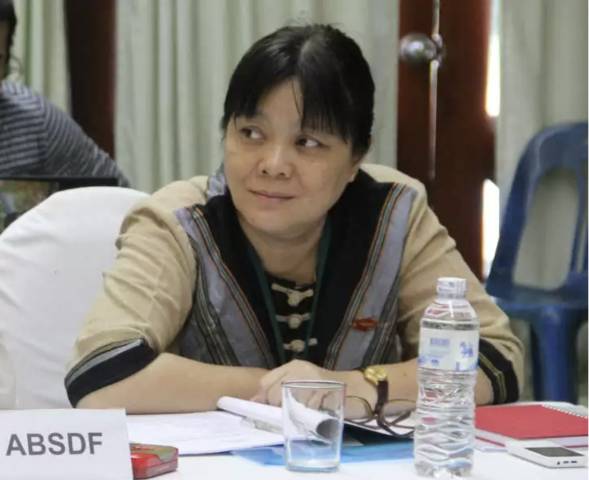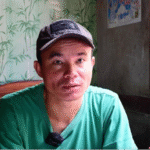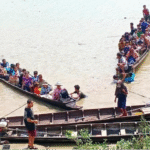An interview with Daw Mi Sue Pwint, spokesperson for the Myanmar Women, Peace and Security (M-WPS), on the situation of women in resistance forces experiencing gender-based violence (GBV).
The Myanmar Women, Peace and Security Group (M-WPS) is working to strengthen women’s participation in peace-building and nation-building, prevent gender-based violence (GBV) in conflict, and implement programs that can support assistance for displaced people.
In June, the M-WPS issued a statement calling for the establishment of a reporting mechanism for violence against women within revolutionary forces during the current revolutionary period. In addition, the M-WPS is in talks to create a mechanism to protect against GBV within resistance groups.
The M-WPS has pointed out that, like women in various sectors in Myanmar, women within resistance forces also experience sexual and gender-based violence in the conflict and that the complaint mechanisms in the respective organizations are not very systematic. Furthermore, they note that the impunity of perpetrators of violence poses a major challenge for women’s safety.
To learn more about the situation of women facing GBV within the resistance forces, the causes of GBV, and the protection measures being taken, Karen Information Center (KIC) conducted this interview with Daw Mi Sue Pwint, a founding member of the Women’s League of Burma, a leader of the Burmese Women’s Union, and a spokesperson for the Myanmar Women, Peace and Security (M-WPS).
(Daw Mi Sue Pwint is also a member of the All Burma Students’ Democratic Front – ABSDF).
Q: In the M-WPS statement released on June 15, it was mentioned that women in resistance forces experience GBV (Gender-Based Violence). What forms of abuse are they experiencing?
A: The types of gender-based violence happening within the resistance forces are mostly perpetrated by commanders and trainers, though there are also cases of abuse between fellow members. For example: calling a female medic to their room under the pretext of being unwell, then taking advantage of the situation; asking for excessive favors or services; requesting massages or application of medication without proper clothing; victims feeling unable to speak up due to the perpetrator’s higher rank, or not knowing who to report to; trainers repeatedly making “accidental” physical contact during training sessions; if complaints are made, perpetrators may retaliate with verbal abuse or punishment; insinuating comments made outside of training hours; and abuse of authority as a trainer.
And threats of rape if the victim reports the abuse. These are just a few common examples. Some incidents are not detailed for security reasons to protect the identity of the victims. In some camps, it’s reported that women are told: “We’re fighting a war and risking our lives for the revolution. What’s the big deal if you give in a little?”
Even in rape cases, punishment of the perpetrators is sometimes delayed under the excuse of ongoing duties. Victims often find themselves in insecure circumstances and are in constant risk of danger. Internal rules and laws often offer no protection. There’s a lack of established core values, rules, laws, and reporting mechanisms for sexual harassment and violence. The procedures for taking action and ensuring justice are almost non-existent or very limited.
Q: What do you think are the main reasons behind these issues? Can you explain?
A: The main reasons lie in the fact that in the armed forces, leadership positions are predominantly held by men. This leads to a lack of respect and recognition for female members. There’s a poor understanding of women’s rights and gender-specific values, a weakness in mutual respect and recognition, and the prevalence of patriarchal thinking in governing committees. The worst thing is the impunity from punishment. It’s crucial for resistance forces to break away from the corrupt mentality typically found in ordinary neighborhoods.
Q: Based on the current available information, how weak is the handling of GBV within the resistance forces?
A: I’d say it’s extremely weak, almost non-existent. In the past, we have heard that some ethnic armed organizations would impose the death penalty for rape. To know for sure, we would need to study organizational rules of individual groups. But, given their long-term experience in building armed forces and governing their own territories and people, cases of sexual violence rarely seem to reach outside the organizations.
The difficulty in communication between different areas in the past might also be a factor. After 2021, the momentum of the armed resistance has increased significantly, with many new armed revolutionary groups forming. Some units are well-managed, others are not. Even if other crimes are taken seriously, little attention is paid to sexual violence, harassment, and abuse.
Complaint mechanisms are not systematically established, and even where they exist, there are still many barriers to actual reporting. Victims are at risk of retaliation and insecurity. In border areas, perpetrators sometimes escape across the borders or seek refuge with other armed groups. So, it’s important to have mechanisms within each group but also to build strong communication and relationships between different armed groups. There’s a need for mutual support and legal accountability regarding sexual violence crimes, which requires commitment to joint action.
Q: Besides the complaint mechanisms, what else does M-WPS think is needed to minimize and eliminate GBV?
A: It’s crucial to guide with revolutionary thinking. From basic military training, we need to educate about gender-based discrimination and violence. Revolutionary comrades must take an oath not to commit such acts. We need to systematically prepare and adopt comrade handbooks.
We need to establish and follow specific guidelines for relationships within the forces, with allies, and with the public. Continuous education is necessary. We must always be vigilant and prevent gender-based violence, recognizing that it can escalate to the level of serious war crimes committed by the armed forces using weapons that hinder and obstruct the revolution.
Q: What message would you like to convey to the ethnic forces, resistance and political organizations concerned?
A: Throughout Myanmar’s revolutionary history, although it has been predominantly men who have taken the lead, women have also played an important role in various areas. Women need to be recognized, valued, and given the opportunity to train and develop their skills to take on more revolutionary responsibilities.
We must cultivate proper internal relationships that respect female members of the resistance. Women in the revolution should not be sexually harassed or abused. Resistance organizations and leaders must guarantee this. In the long run, only the resistance forces that can confidently provide such guarantees will surely continue marching towards the goal of federal democracy.
Sent by KIC.



